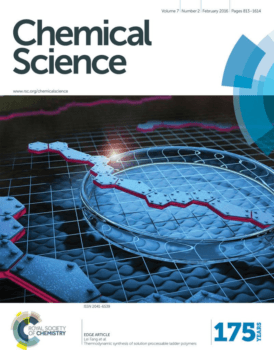Rising Star: Chemist Lei Fang Earns NSF ‘CAREER’ Award

Lei Fang, assistant professor of chemistry at Texas A&M University, has been selected to receive a 2017 National Science Foundation (NSF) Faculty Early Career Development (CAREER) Award in support of his research on polymer properties and dynamic bond-promoted coplanarity.
Fang’s proposal, “Conformational Control of pi-Conjugated Polymeric Materials through Dynamic Bonds,” has been funded through the Division of Materials Research in the projected total amount of $559,818 beginning in June 2017 and continuing through May 2022. His work capitalizes on his expertise in chemical synthesis, process engineering and materials characterization, which he uses to manipulate semiconducting polymers from the molecular to sub-nanoscale levels with possible application in a host of industries and across multiple disciplines.
Fang, a faculty member since 2013 in the Texas A&M Department of Chemistry who also holds a joint appointment in the Department of Materials Science and Engineering, says his project aims to investigate the fundamental correlation between the geometry of electrically semiconducting polymer molecules and their corresponding materials properties. Most polymeric molecules possess structural flexibility at the nanometer and subnanometer scales, which leads to various 3D shapes that they can adopt. Such geometric variability impacts a wide range of polymer properties that are important for their applications, especially those related to electronic and optical properties.
Fang notes that precision control of the molecular shapes of semiconducting polymers – which has been a long-standing scientific challenge — is critical. His CAREER project will seek to tackle this problem by synthesizing molecules with reversible and controllable interactions between different segments along the polymer chain. Using this approach, planarized geometries of these polymer molecules can be enforced and disrupted on demand, leading to tailored properties as a result of the switchable molecular shapes. Fang believes that establishment of this structural control may not only enable the access of improved functional performance, but also allow for feasible processing of polymer materials into application-relevant forms.
“The shapes of semiconducting polymers impacts a wide range of their properties and applications, but are challenging to control,” Fang said. “We will use reversible and controllable molecular interactions to manipulate such molecular geometry so that unprecedented properties and performances can be achieved in electronically conductive polymers.”
Fang says the knowledge gained in this project will advance fundamental understanding in materials-related sciences and benefit multiple research disciplines and STEM education. The work also features an educational component focused on connecting scientific concepts and real-world personal knowledge for the students through relevant experiments in the laboratory and immersive learning experiences. He points to various beneficial societal impacts of this project, including scientific publications, new course components, educational software, and trained STEM students for academia and industry.

“This award supports our educational efforts by connecting scientific concepts and real-world personal knowledge for the students through relevant experiments in the lab and immersive learning experiences,” Fang said.
Fang received his doctorate in chemistry from Northwestern University in 2010, studying under 2016 Nobel Prize in Chemistry co-recipient Sir James Fraser Stoddart. He earned both his bachelor’s and master’s of science degrees in chemistry from Wuhan University in China in 2003 and 2006, respectively. Prior to coming to Texas A&M in 2013, Fang spent three years as a postdoctoral scholar at Stanford University. A rising star in polymer and materials science, he recently was named a 2017 American Chemical Society Division of Polymeric Materials: Science and Engineering (PMSE) Young Investigator.
At Texas A&M, Fang leads a multidisciplinary research group studying functional organic materials with electronic, thermal or photo-activity. His current research goal is to gain insights into design principles and structure-property relationships of these materials at both the molecular and the macroscopic scale by employing the toolboxes of synthetic chemistry and process engineering. In particular, the Fang research group focuses on the bottom-up synthesis and processing of ladder polymers and microporous polymer networks for applications associated with electronics and energy conversion/storage.
“I am delighted that Lei has been recognized with a CAREER Award,” said Dr. Simon W. North, professor and head of Texas A&M Chemistry. “The combination of creative synthetic methods and establishment of important structure-property relationships should afford molecular systems with novel structures and properties previously inaccessible. The potential applications of his work will have broad impact and influence in disciplines beyond chemistry.”
The NSF CAREER Award was established to support junior faculty within the context of their overall career development, combining in a single program the support of research and education of the highest quality and in the broadest sense. Through this program, the NSF emphasizes the importance on the early development of academic careers dedicated to stimulating the discovery process in which the excitement of research is enhanced by inspired teaching and enthusiastic learning.
Click here to learn more about the NSF and the CAREER program.
For additional information about Fang and his research, go to http://www.chem.tamu.edu/rgroup/fang/.
Media contact: Shana K. Hutchins, Texas A&M College of Science.





